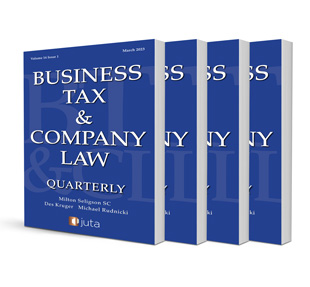
No Boardroom, No Debate: Resolving the Tension Between Round-Robin Resolutions and Company Law Democratic Principles
Authors: Matthew Blumberg SC and Matt Williams
ISSN: 2219-1585
Affiliations: N/A
Source: Business Tax & Company Law Quarterly, Volume 16 Issue 1, 2025, p. 1 – 6
Abstract
The primary decision-making organ of a company is its board of directors. The board functions based on majority rule, but only once the minority has had an opportunity of ventilating their views. This is the basic democratic principle of our company law. Board decisions are normally made at board meetings, where the minority has a forum to ventilate their view. But board decisions can also be made through round-robin resolutions, where there is no meeting. Without a meeting, the minority has no forum to ventilate their views. There is therefore a measure of tension between (non-unanimous) round-robin resolutions and the basic democratic principle. In this article, we consider — following a recent High Court judgment on the topic — how this tension is to be resolved. We describe the basic democratic principle and demonstrate that it is also reflected in the provisions of the Companies Act 71 of 2008. We then explore the tension between (non-unanimous) round-robin decision-making and the basic democratic principle. We conclude — as did the court in the aforementioned judgment — that any potential tension is reconciled through the requirement of proper notice. In this way, round-robin resolutions strike a balance — between pragmatism and efficiency, on the one hand, and adherence to the democratic principle, on the other.